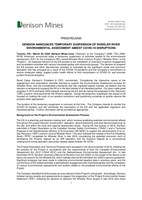News
Denison Announces Temporary Suspension of Wheeler River Environmental Assessment Amidst COVID-19 Disruptions
TORONTO, March 20, 2020 /CNW/ - Denison Mines Corp. ("Denison" or the "Company") (DML: TSX, DNN: NYSE American) announced today a temporary suspension of activities related to the environmental assessment ("EA") for the Company's 90% owned Wheeler River Uranium Project ("Wheeler River" or the "Project"). An important element of the EA process is the completion of extensive in-person engagement and consultation activities with various interested parties and community groups. The decision to suspend the EA process and other discretionary activities is motivated by the significant social and economic disruption that has emerged as a result of the COVID-19 pandemic and the Company's commitment to ensure employee safety, support public health efforts to limit transmission of COVID-19, and exercise prudent financial discipline. View PDF version.
David Cates, Denison's President & CEO, commented, "Considering the interactive nature of the engagement and consultation activities planned to support the Environmental Assessment process for Wheeler River, and the considerable uncertainty that has impacted capital markets, we believe that the decision to temporarily suspend the EA is in the best interest of all interested parties. Our team made great progress in 2019 and early 2020 towards advancing the EA and de-risking the proposed In-Situ Recovery ('ISR') uranium mine planned for the Phoenix deposit. During the temporary suspension we expect to be focused on making the most of our positive momentum and positioning ourselves to quickly resume the process when appropriate."
The duration of the temporary suspension is unknown at this time. The Company intends to monitor the COVID-19 situation and will coordinate the resumption of the EA with the applicable regulators and interested parties. Further information will be provided as appropriate.
Background on the Project's Environmental Assessment Process
The EA is a planning and decision-making tool, which involves predicting potential environmental effects throughout the project lifecycle (construction, operation, decommissioning and post-decommissioning) at the site, and within the local and regional assessment areas. During the first quarter of 2019, Denison submitted a Project Description to the Canadian Nuclear Safety Commission ("CNSC") and a Technical Proposal to the Saskatchewan Ministry of Environment ('SK MOE') to support the advancement of an In-Situ Recovery ("ISR") uranium mine at Wheeler River. This work followed the release of the Pre-Feasibility Study ("PFS") completed for Wheeler River in late 2018, considering the potential economic merit of developing the Phoenix deposit as an ISR operation and the Gryphon deposit as a conventional underground mining operation (see press release dated October 30, 2018) .
The Project Description and Technical Proposal were accepted in the second quarter of 2019, initiating the EA process for the Project in accordance with the requirements of both the Canadian Environmental Assessment Act, 2012 ('CEAA 2012') and the Saskatchewan Environmental Assessment Act. In late December 2019, Denison received a Record of Decision from the CNSC on the scope of the factors to be taken into account for the Wheeler EA, which indicate that the EA will follow the CNSC's generic guidelines. Significant progress has been made in collecting environmental baseline data in previous years, and the current focus of EA related activities is split between engagement with interested parties and the completion of various environmental assessments and studies related to the predicted environmental effects of the Project.
The Company identified the EA process as a key element of the Project's critical path. Accordingly, Denison initiated various studies and assessments to support the preparation of the Project Environmental Impact Statement ("EIS"), following the decision to advance the Wheeler River project in late 2018 (see press release dated December 18, 2018). The decision to temporarily suspend the EA process is expected to impact the project development schedule outlined in the PFS for Wheeler River. Given the uncertainty associated with the duration of the suspension, the Company is not currently able to estimate the impact to schedule. Further information, including a revised development schedule, will be provided as appropriate.
Impact on Outlook for 2020
The Company announced its plans for 2020 in its annual MD&A for the year ended December 31, 2019 (the "2020 Outlook"). Those plans identified two discretionary work programs related to the advancement of Wheeler River: (1) the continuation of the EA and submission of a draft EIS to the Federal and Provincial regulators (approximately $7.0 million), and (2) the completion of further ISR field testing to support wellfield designs for a future Feasibility Study (approximately $6.6 million). Given the decision to suspend the EA, and the current economic disruption associated with COVID-19, these work programs are not currently expected to advance in 2020. Based on the 2020 Outlook, the Company intends to maintain its environmental and technical teams in 2020 and to selectively advance certain scopes of work, outside of the discretionary work programs, to position the Company to quickly resume project development activities in the future and minimize the impact to the project schedule.
About Wheeler River
Wheeler River is the largest undeveloped uranium project in the infrastructure rich eastern portion of the Athabasca Basin region, in northern Saskatchewan – including combined Indicated Mineral Resources of 132.1 million pounds U3O8 (1,809,000 tonnes at an average grade of 3.3% U3O8), plus combined Inferred Mineral Resources of 3.0 million pounds U3O8 (82,000 tonnes at an average grade of 1.7% U3O8). The project is host to the high-grade Phoenix and Gryphon uranium deposits, discovered by Denison in 2008 and 2014, respectively, and is a joint venture between Denison (90% and operator) and JCU (Canada) Exploration Company Limited (10%).
Pursuant to the PFS, the Project is estimated to have mine production of 109.4 million pounds U3O8 over a 14-year mine life, with a base case pre-tax NPV of $1.31 billion (8% discount rate), Internal Rate of Return ("IRR") of 38.7%, and initial pre-production capital expenditures of $322.5 million. The Phoenix ISR operation is estimated to have a stand-alone base case pre-tax NPV of $930.4 million (8% discount rate), IRR of 43.3%, initial pre-production capital expenditures of $322.5 million, and industry leading average operating costs of US$3.33/lb U3O8. The PFS is prepared on a project (100% ownership) and pre-tax basis, as each of the partners to the Wheeler River Joint Venture are subject to different tax and other obligations.
Further details regarding the PFS, including additional scientific and technical information, as well as after-tax results attributable to Denison's ownership interest, are described in greater detail in the NI 43-101 Technical Report titled "Pre-feasibility Study for the Wheeler River Uranium Project, Saskatchewan, Canada" dated October 30, 2018 with an effective date of September 24, 2018. A copy of this report is available on Denison's website and under its profile on SEDAR at www.sedar.com and on EDGAR at www.sec.gov/edgar.shtml.
About Denison
Denison is a uranium exploration and development company with interests focused in the Athabasca Basin region of northern Saskatchewan, Canada. In addition to the Wheeler River project, Denison's Athabasca Basin exploration portfolio consists of numerous projects covering approximately 305,000 hectares. Denison's interests in the Athabasca Basin also include a 22.5% ownership interest in the McClean Lake joint venture ("MLJV"), which includes several uranium deposits and the McClean Lake uranium mill, which is currently processing ore from the Cigar Lake mine under a toll milling agreement, plus a 25.17% interest in the Midwest and Midwest A deposits, and a 66.57% interest in the J Zone and Huskie deposits on the Waterbury Lake property. Each of Midwest, Midwest A, J Zone and Huskie are located within 20 kilometres of the McClean Lake mill.
Denison is also engaged in mine decommissioning and environmental services through its Closed Mines group (formerly Denison Environmental Services), which manages Denison's Elliot Lake reclamation projects and provides post-closure mine care and maintenance services to a variety of industry and government clients.
Denison is also the manager of Uranium Participation Corp., a publicly traded company which invests in uranium oxide and uranium hexafluoride.
Cautionary Statement Regarding Forward-Looking Statements
Certain information contained in this news release constitutes 'forward-looking information', within the meaning of the applicable United States and Canadian legislation concerning the business, operations and financial performance and condition of Denison.
Generally, these forward-looking statements can be identified by the use of forward-looking terminology such as 'plans', 'expects', 'budget', 'scheduled', 'estimates', 'forecasts', 'intends', 'anticipates', or 'believes', or the negatives and/or variations of such words and phrases, or state that certain actions, events or results 'may', 'could', 'would', 'might' or 'will be taken', 'occur', 'be achieved' or 'has the potential to'.
In particular, this news release contains forward-looking information pertaining to the following: the EA process, including its intended scope, objectives and timing; the results of the PFS and expectations with respect thereto (including potential for delays as a result of the temporary suspension of the EA and other discretionary programs and expenditures); evaluation and development plans and objectives generally and in Denison's 2020 Outlook; and expectations regarding its joint venture ownership interests and the continuity of its agreements with its partners.
Forward looking statements are based on the opinions and estimates of management as of the date such statements are made, and they are subject to known and unknown risks, uncertainties and other factors that may cause the actual results, level of activity, performance or achievements of Denison to be materially different from those expressed or implied by such forward-looking statements. For example, if market conditions remain volatile and/or COVID-19 mitigation measures result in more social and economic disruptions, Denison may need to further re-assess its discretionary and non-discretionary expenditures and programs for 2020 and beyond, which could have significant impacts on Denison and/or the development of the Project. Denison believes that the expectations reflected in this forward-looking information are reasonable but no assurance can be given that these expectations will prove to be accurate and results may differ materially from those anticipated in this forward-looking information. For a discussion in respect of risks and other factors that could influence forward-looking events, please refer to the factors discussed in Denison's Annual Information Form dated March 13, 2020 under the heading 'Risk Factors'. These factors are not, and should not be construed as being exhaustive.
Accordingly, readers should not place undue reliance on forward-looking statements. The forward-looking information contained in this news release is expressly qualified by this cautionary statement. Any forward-looking information and the assumptions made with respect thereto speaks only as of the date of this news release. Denison does not undertake any obligation to publicly update or revise any forward-looking information after the date of this news release to conform such information to actual results or to changes in Denison's expectations except as otherwise required by applicable legislation.
Cautionary Note to United States Investors Concerning Estimates of Measured, Indicated and Inferred Mineral Resources and Probable Mineral Reserves: This news release may use the terms 'measured', 'indicated' and 'inferred' mineral resources. United States investors are advised that while such terms have been prepared in accordance with the definition standards on mineral reserves of the Canadian Institute of Mining, Metallurgy and Petroleum referred to in Canadian National Instrument 43-101 Mineral Disclosure Standards ("NI 43-101") and are recognized and required by Canadian regulations, the United States Securities and Exchange Commission ("SEC") does not recognize them. 'Inferred mineral resources' have a great amount of uncertainty as to their existence, and as to their economic and legal feasibility. It cannot be assumed that all or any part of an inferred mineral resource will ever be upgraded to a higher category. Under Canadian rules, estimates of inferred mineral resources may not form the basis of feasibility or other economic studies. United States investors are cautioned not to assume that all or any part of measured or indicated mineral resources will ever be converted into mineral reserves. United States investors are also cautioned not to assume that all or any part of an inferred mineral resource exists, or is economically or legally mineable. The estimates of mineral reserves in this news release have been prepared in accordance with NI 43-101. The definition of probable mineral reserves used in NI 43-101 differs from the definition used by the SEC in the SEC's Industry Guide 7. Under the requirements of the SEC, mineralization may not be classified as a "reserve" unless the determination has been made, pursuant to a "final" feasibility study that the mineralization could be economically and legally produced or extracted at the time the reserve determination is made. Denison has not prepared a feasibility study for the purposes of NI 43-101 or the requirements of the SEC. Accordingly, Denison's probable mineral reserves disclosure may not be comparable to information from U.S. companies subject to the reporting and disclosure requirements of the SEC.
SOURCE Denison Mines Corp.






